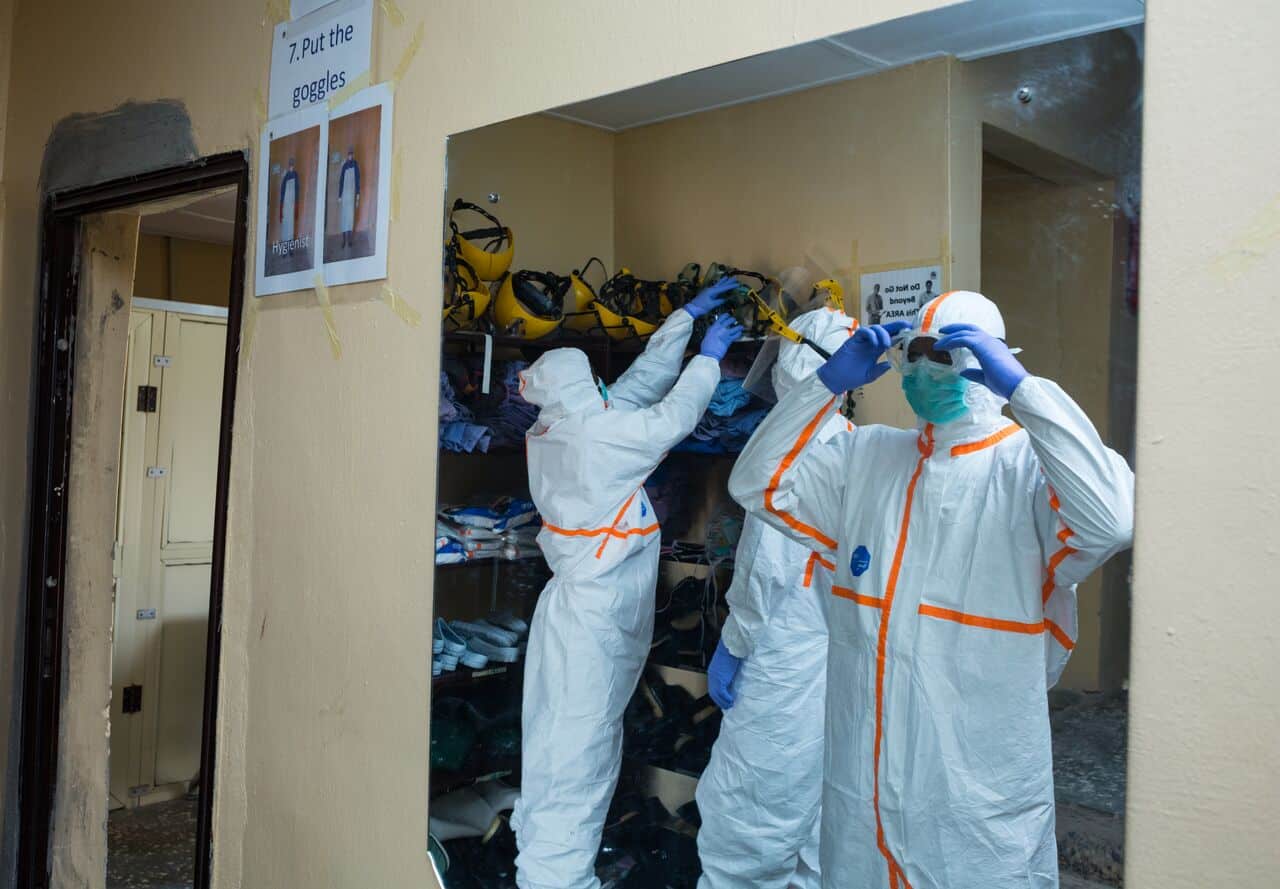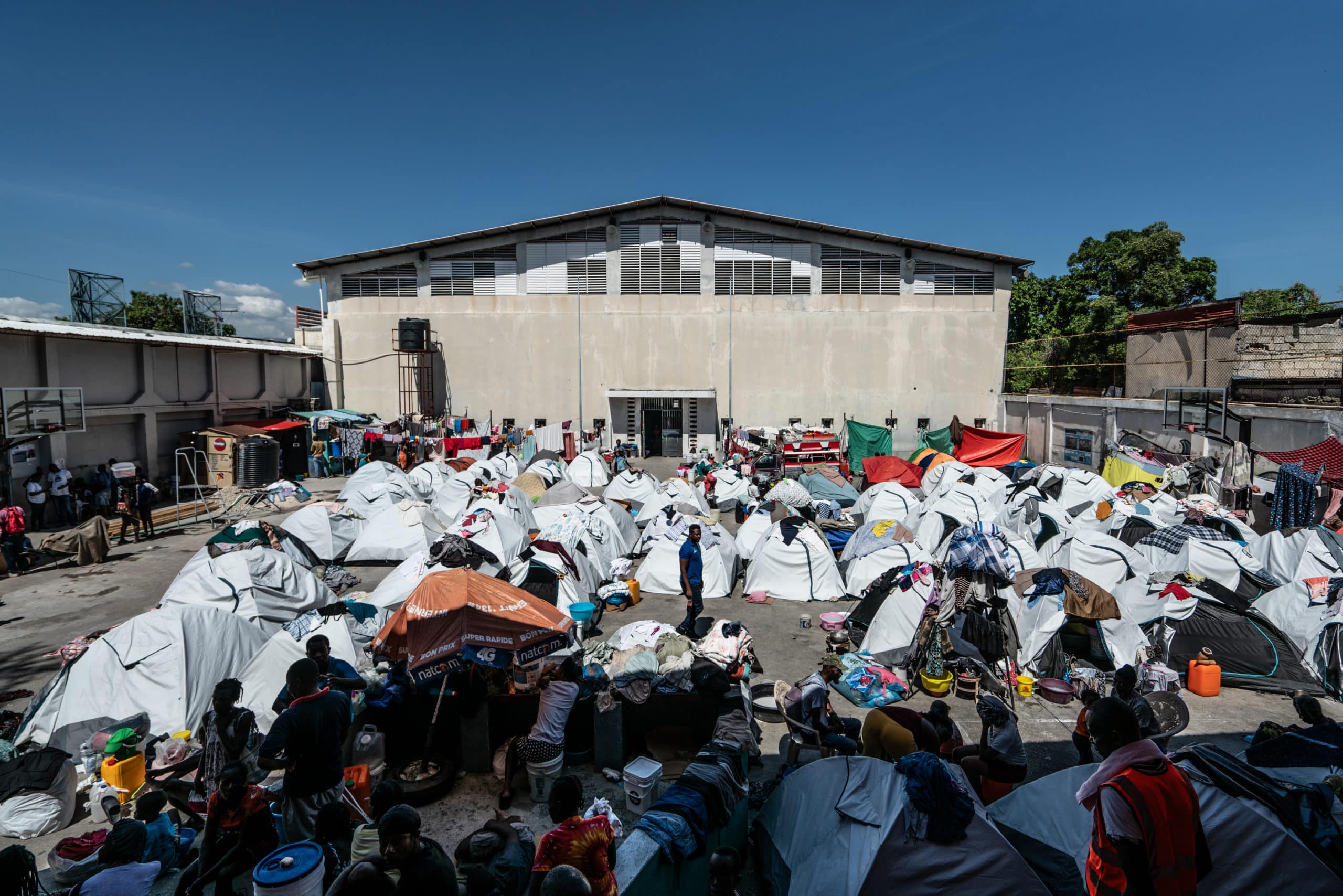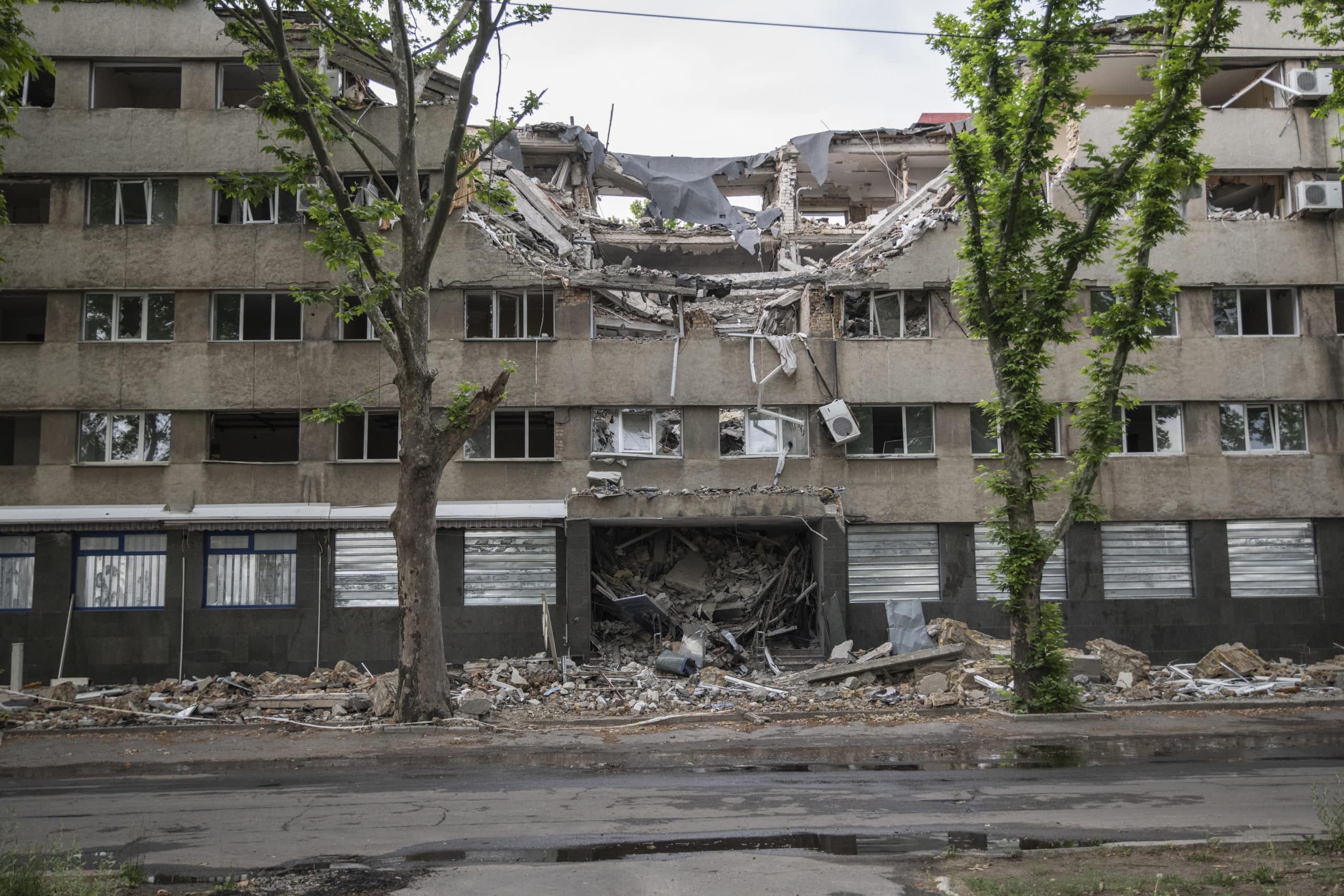During the 22 months that the outbreak lasted, 2,287 people lost their lives, among the 3,470 confirmed cases. A heavy toll for one of the most serious Ebola outbreaks in the history of the DRC. Since June 25, and despite the announcement of a new outbreak of the Ebola Virus Disease in Mbandaka (Equateur province), the country breathed a sigh of relief following the announcement of the end of the 10th outbreak in the east of the country.
This is the result of tireless work by the Congolese health authorities and their partners, including ALIMA (The Alliance for International Medical Action). Since the beginning of the outbreak in August 2018 in the east of the country, all parties have been mobilized to bring the outbreak to an end.
ALIMA health workers at the bedside of a patient hospitalized in the Ebola Treatment Center in Mambasa. December 2019.
Innovation for considerable progress
More than 25 percent of confirmed cases were treated by ALIMA in three treatment centers in North Kivu and Ituri provinces. This considerable progress has been possible thanks to the expertise acquired during previous infectious disease outbreaks, such as during the Ebola epidemic in West Africa (2013-2016), where ALIMA was responding in Guinea.
ALIMA has made significant contributions to improving the care of Ebola patients through its research projects. Its flagship innovation, the Biosecure Emergency Care Units for Epidemics (CUBE), has profoundly transformed humanitarian medicine. Thanks to an improved medical technical platform – notably equipped with resuscitation monitors connected by WiFi and bluetooth, these CUBEs offer the possibility of providing quality intensive care, while ensuring the safety of the nursing staff. Thanks to the 26 CUBEs deployed throughout the country, more reactive patient monitoring and invasive care could be provided without going through the laborious process of putting on personal protective equipment.
Once stabilized, patients, who are cared for in individual rooms, can receive family visits through clear, plastic walls. This new tool contributed to the recovery of the sick and the restoration of trust within the communities.
With complete transparency: At the ALIMA treatment centers (here, in Mambasa), families can visit their loved ones and follow the evolution of their health throughout the hospitalisation. This also allows them to familiarize themselves with the medical care provided by the medical staff. © ALIMA / Olivier Papegnies
ALIMA also participated in the PALM clinical trial, which identified effective two drugs against the virus, in collaboration with the World Health Organization, the National Institute of Biomedical Research of DR Congo, and the NIAID/NIH (National Institute of Allergy and Infectious Diseases).
Populations integrated into care solutions
Patients, especially younger patients, need reassurance and an understanding of the nature of the care that can save them. People of all ages who have survived the worst have thus been trained to help health care workers on a daily basis. Immunized, survivors can go to a patients’ bedside without highly-protective gear to inform and comfort patients. They can even alert health workers when needed.
Getting closer to the patients was one of the great lessons learned in the field in West Africa. At the beginning of 2019, ALIMA decided to decentralize the management of suspected cases to allow them to be admitted in integrated transit centers – structures already known to the communities and managed by health workers they trust.
The Integrated Transit Center in Bundji, near Béni, was equipped by ALIMA to receive suspected Ebola cases. Composed of six individual rooms, it offers care to patients who are isolated while waiting for confirmation of their test results and possible referral to the Ebola treatment center in Béni. © ALIMA / Anne Boher
Seven integrated transit centers were set up by ALIMA in its areas of intervention and handed over to the local health authorities and villages. Surveillance is generalized, and infection prevention and control is reinforced.
Learning lessons, learning from innovations
Eastern DRC was not yet free of Ebola when the Equateur region in the west of the country announced its 11th outbreak. The innovations and lessons learned over the past two years in Ituri and North Kivu must be used to definitively transform the response to Ebola outbreaks.
The aim is to decentralize and facilitate care through integrated transit centers. At the same time, the two Ebola drug treatments must be made immediately available for rapid administration and guaranteed optimized standard care. If these conditions are met, there will no longer be a reason to die from Ebola. Finally, we must ensure that the entire population exposed to the virus has access to the vaccination that has been proven to be effective when used in eastern DRC.
ALIMA is currently responding to the outbreak in Equateur provence through a case surveillance system and the establishment of an integrated transit center at the General Hospital in Mbandaka.
Fighting COVID-19 by supporting the Ministry of Health and accompanying communities
These lessons are also valid in the fight against the COVID-19 pandemic. As of June 30, 7,121 cases of COVID-19 were confirmed in the DRC, the second most populous country in Africa, including 1,785 cured patients and 175 deaths. Using the strength of its experience in the response to outbreaks, ALIMA began to support the Ministry of Health since the beginning of April 2020 in the management of COVID-19. With the end of the Ebola epidemic in the east of the country, the structures dedicated to the management of Ebola have become essential in the fight against the COVID-19 virus.
In Beni (North Kivu), while continuing to support primary health activities, our teams are mobilized to support the management of the fight against COVID-19, for example by installing 10 beds in the Regional General Hospital of Beni.
ALIMA also intervenes at the University Clinics in Kinshasa, the capital of the country, which alone accounts for 90% of COVID-19 cases (6,274 confirmed cases as of June 30). Since the opening of the COVID-19 Treatment Center in Kinshasa, ALIMA has treated 227 patients.
Dozens of health care providers, including nurses, doctors, pediatricians, midwife and engineers specializing in water and sanitation, are also benefiting from training to strengthen their capacity in the context of COVID-19. 790 health workers have benefited from specialized training sessions in the management of this pandemic.
ALIMA has been present in DRC since 2011. Its experience in the response to Ebola and its knowledge of the country allows it to be a sustainable part of the medical landscape.
ALIMA’s projects in the fight against the Ebola outbreak in North Kivu and Ituri benefit from the generous support of USAID/OFDA and the Paul G. Allen Foundation. ALIMA’s projects in the fight against COVID-19 in DRC are supported by AFD (Agence Française de Développement/French Development Agency), the Bill and Melinda Gates Foundation, RTSL (Resolve to Save Lives)/Vital Strategies, the Skoll Foundation, the Emergency Humanitarian Fund (EHF). In Béni, our primary healthcare projects are supported by ECHO.
More information on CUBE and ALIMA research.
The Lancet: The evolution of supportive care for Ebola virus disease, by ALIMA’s Dr. Richard Kojan
The New England Journal of Medicine: Shifting the Paradigm – Applying Universal Standards of Care to Ebola Virus Disease, by ALIMA’s Dr. Richard Kojan
*Cover photo: © Jennifer Lazuta / ALIMA



